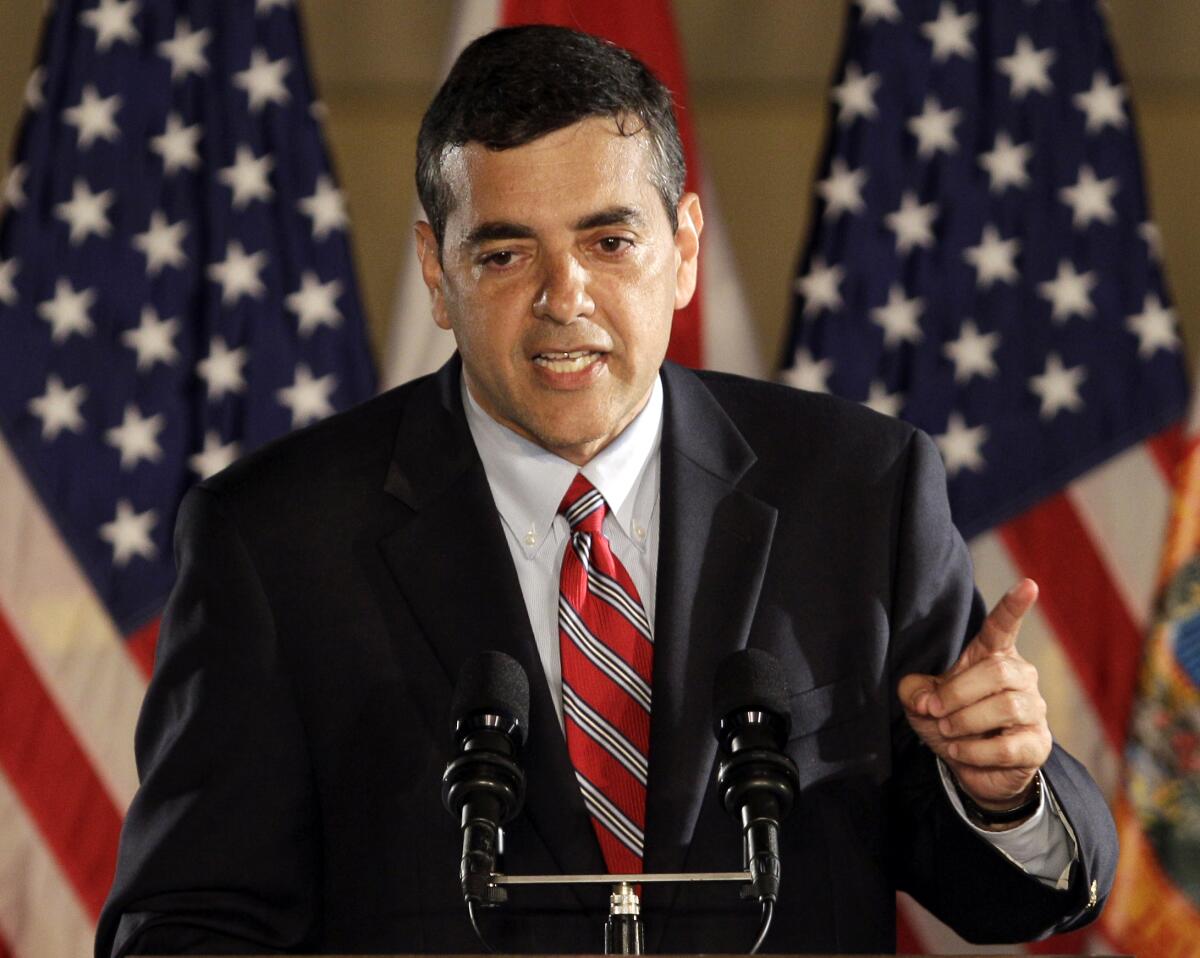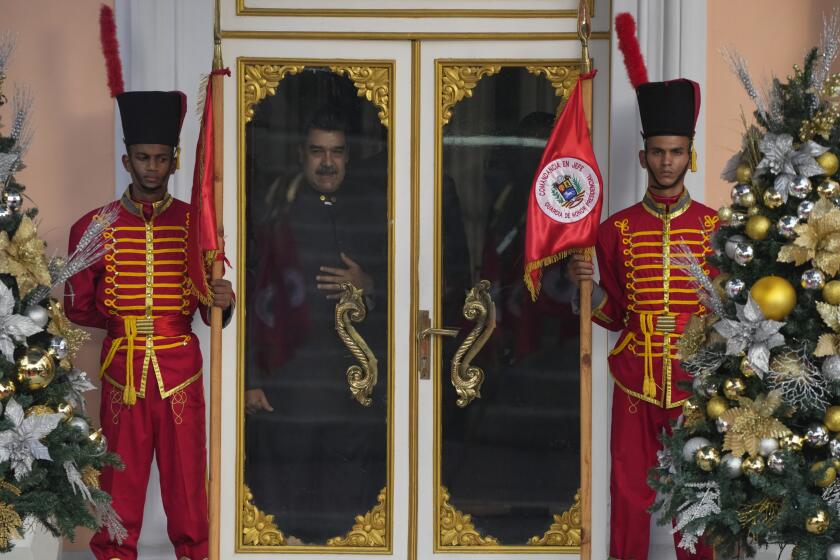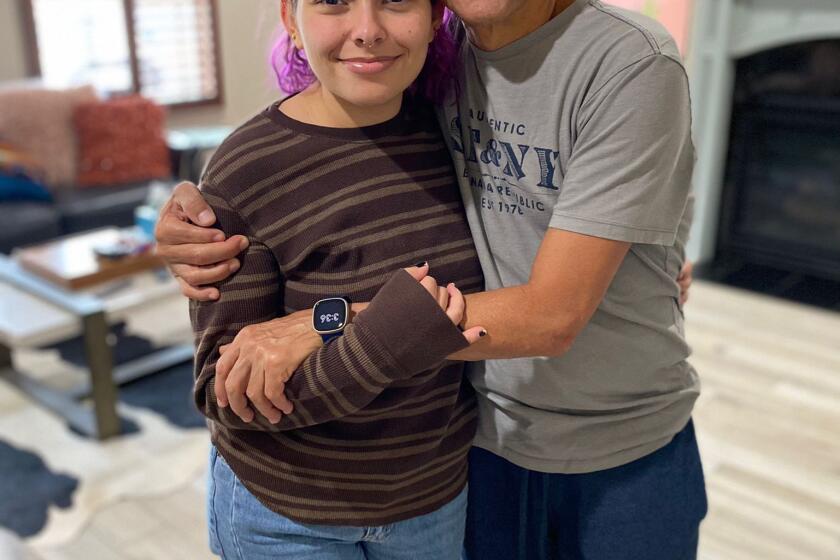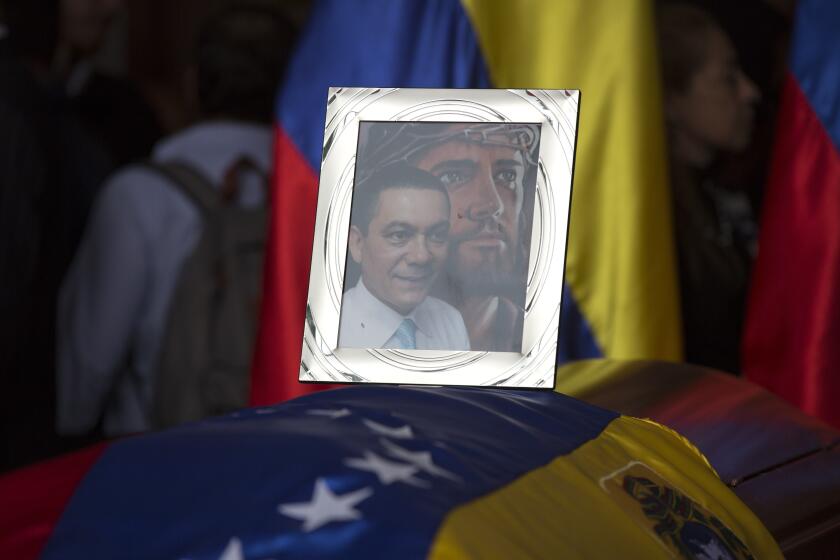Republican former congressman arrested over ties to Venezuelan government

WASHINGTON — A former Miami congressman who signed a $50-million consulting contract with Venezuela’s socialist government was arrested Monday on suspicion of money laundering and representing a foreign government without registering.
David Rivera, a Republican who has been marred by scandals dating back to his days in Congress from 2011 to 2013, was arrested at Atlanta’s airport, according to the U.S. attorney’s office in Miami.
The eight-count indictment alleges that Rivera, at the start of the Trump administration, was part of a conspiracy to lobby on behalf of Venezuela to lower tensions with the U.S., resolve a legal dispute with a U.S. oil company and end U.S. sanctions against the South American nation — all without registering as a foreign agent.
The indictment cites meetings in Washington, New York and Dallas that Rivera either attended or tried to set up for allies of Venezuelan President Nicolas Maduro with U.S. lawmakers and a top Trump aide.
To hide the sensitive nature of his work, prosecutors say, Rivera referred to Maduro in chat messages as the “bus driver,” a congressman as “Sombrero” and millions of dollars as “melons.”
While none of the U.S. officials is named, evidence in a parallel lawsuit brought against Rivera show that, while working for Venezuela, the former congressman was in contact with Florida Republican Sen. Marco Rubio, a longtime friend who helped drive the Trump administration’s hard-line policy on Maduro.
As part of the charm offensive, Rivera also looked to set up a possible flight and a meeting on the jet between a pro-Maduro businessman and a female campaign advisor-turned-White House “counselor” on June 27, 2017 — the same day Trump aide Kellyanne Conway was in Miami for a fundraising dinner with Miami Republicans.
Some 90% of Venezuelans live in poverty and inflation recently topped 200%. But many have taken note of improvements: wider availability of food, more reliable electricity, water and telephone service, sufficient supplies of gasoline, fewer people fleeing.
Rivera also roped in GOP Rep. Pete Sessions of Texas to try to set up a meeting for Venezuela’s foreign minister with executives from Exxon, which was headquartered in Sessions’ district at the time.
In July 2017, for example, the indictment alleges that Rivera wrote text messages to an unnamed U.S. senator ahead of a key meeting at the White House where he hoped the senator would discuss a possible deal to end Venezuela’s stubborn political conflict.
“Remember, US should facilitate, not just support, a negotiated solution,” he wrote. “No vengeance, reconciliation.”
Rubio’s and Sessions’ offices didn’t immediately respond to requests for comment.
Facing pressure the curb the influx of Venezuelan migrants, the Biden administration begins using a controversial law to expel them to Mexico.
Pressure has been building on Rivera for more than two years after it emerged that he received the massive contract from a U.S. affiliate of Venezuela’s state-owned oil company as Maduro was trying to curry favor with the Trump administration.
Rivera’s Interamerican Consulting was sued in 2020 by PDV USA — a Delaware-based affiliate of Venezuelan-owned Citgo — for not living up to the contract he signed in 2017 for three months of “strategic consulting.”
Although Rivera’s contract was originally signed with a U.S. entity, any work he performed on behalf of Maduro’s government or Venezuelan business interests required him to register as a foreign lobbyist.
It was something prosecutors say Rivera acknowledged himself in October 2017 when he sent a text message relaying a lawyer’s advice to stay away from parent company PDVSA in Caracas, with failure to do so risking “a scandal of monumental proportions.” Three weeks later, prosecutors say, Rivera received a $5-million payment from PDVSA’s account at Gazprom Bank in Russia.
The release of two jailed Americans came hours after Venezuelan President Nicolás Maduro signaled an interest in improving relations with the U.S. amid Russia’s war on Ukraine.
Rivera, 57, has maintained his innocence and has countersued PDV USA, alleging breach of contract and unjust enrichment for its failure to pay $30 million he says he is still owed. A lawyer for Rivera said he had not seen the indictment, and Rivera did not immediately respond to a request for comment.
The U.S. Marshals Service said Rivera bailed out of jail Monday afternoon after making an initial appearance in Atlanta federal court.
Around the time Rivera was hired, Maduro’s government was seeking to court the new Trump administration, donating $500,000 to the new president’s inaugural committee through Citgo. The outreach effort ultimately failed, as the U.S. in 2019 recognized opposition lawmaker Juan Guaidó as Venezuela’s legitimate leader and imposed stiff oil sanctions on the OPEC member nation in a bid to unseat Maduro.
Records that emerged as part of the ongoing lawsuit show that Rivera’s consulting work was closely coordinated with Raul Gorrin, a Venezuelan insider and media tycoon who has been sanctioned and indicted in the U.S. on money-laundering charges.
Venezuelan opposition activist Fernando Albán died in custody in what a U.S. judge called a ‘murder for hire’ by associates of Venezuela’s president.
Correspondence introduced as part of the lawsuit shows Rivera and Gorrin discussing buying “concert tickets” — a possible code word for bribes — for unnamed officials and attempting to coordinate a meeting between Venezuela’s foreign minister and executives from Exxon.
As part of that effort, they also roped in Sessions, who secretly traveled to Venezuela in 2018 to meet with Maduro.
Before being elected to Congress, Rivera was a high-ranking Florida state legislator, serving from 2003 to 2010 in the House. During that time, he shared a Tallahassee home with Rubio, who eventually became Florida House speaker.
Rivera has been embroiled in several election-related controversies, including orchestrating the stealth funding of an unknown Democratic candidate to take on his main rival in a south Florida congressional race and a state investigation into whether he hid a $1-million contract with a gambling company. That probe also involved possible misuse of campaign funds to pay for state House activities whose expenses were already reimbursed by the state.
More to Read
Sign up for Essential California
The most important California stories and recommendations in your inbox every morning.
You may occasionally receive promotional content from the Los Angeles Times.














